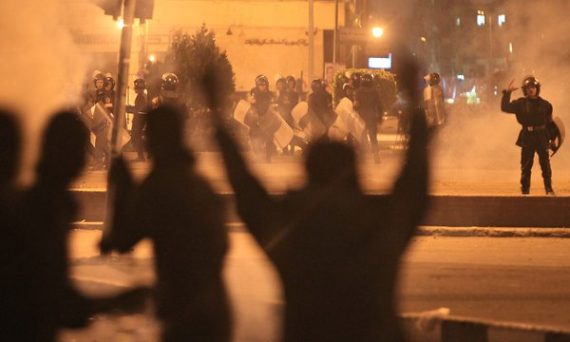Egypt On The Brink Of Economic Chaos?
Could economic chaos bring Egyptians back out into the streets?
Steven Cook at the Council on Foreign Relations notes that Egypt may be on the brink of a serious economic crisis:
Egypt is perilously close to becoming insolvent, meaning a default on its debts. As I argue in a recent Council on Foreign Relations Contingency Planning Memorandum, despite Gulf assistance, the combination of the country’s economic needs, the legacies of Cairo’s incoherent economic policies of the past along with their continuation today, the political challenges to economic reform, and the potential for exogenous shocks all make a solvency crisis a significant possibility. This might sound surprising to the casual observer of Egypt. The economy was a subject of intense coverage in the months preceding the July 3, 2013 coup, but has receded from view as Saudi Arabia, the United Arab Emirates, and Kuwait stepped in with an initial $12 billion infusion of aid that was followed recently with another $8 billion. The money from the Gulfies was supposed to stabilize the Egyptian economy, but the numbers do not lie. The country’s foreign currency reserves—between $16-$17 billion—are close to where they were in late 2012 and the first half of 2013, which means Egypt is hovering just above the critical minimum threshold defined as three months of reserves to purchase critical goods. A portion of those reserves are not liquid and with a burn rate estimated to be $1.5 billion per month, it is easy to understand why Egypt is one exogenous shock—think Ukraine, which is a major producer of wheat and Egypt is the world’s largest importer of it—or political crisis away from default. The Saudi, Emirati, and Kuwaiti money has merely kept the Egyptians above water. The expansionary fiscal policies and stimulus that the Egyptian government is pursuing help in the short-run, but they also produce additional near-term debt. This is not a good place for Egypt to be with government debt at 89 percent of GDP and overall debt at more than 100 percent of economic output. Much of this has been financed through domestic borrowing—67 percent of Egyptian bank assets are claims on the government.
As Cook notes, the consequences of economic trouble in Egypt could be quite severe indeed:
An economic problem the magnitude of a solvency crisis will only intensify the pathologies that Egypt is already experiencing—violence, political tumult, and general uncertainty. Economic decline would create a debilitating feedback loop of more political instability, violence, and further economic deterioration. It’s a scary scenario that deserves attention and preparedness, but there does not seem to be much urgency to try to address it anywhere. Gulf money appears to have lulled people into the sense that the Saudis, Emiratis, and Kuwaitis will stave off disaster. It’s a false sense of security.
On the surface at least, economic trouble would likely lead to yet another round of political and social unrest in the streets of Egypt’s cities. Indeed, one of the major factors that motivated the protests that brought down Hosni Mubarak in January and February 2011 was the fact that the government had increased the street price of bread and other food staples due to shortages, which in turn caused prices for basic needs to skyrocket across the board. Additionally, while the political actions of the Morsi regime were the focus of the protests that led to the July 2013 military coup, reports at the time also pointed to widespread public frustration with the fact that the new government had done little to fix the economic problems that had existed two years earlier or the widespread unemployment. Another round of economic troubles could lead to another round of protests, which would likely lead to military crackdowns.
The other possibility, of course, is that economic unrest will lead to destabilization of the government of the most populated nation in the Arab world and that Egypt would become a breeding ground for radicalism. We’ve already seem some of this in the sparsely populated Sinai Peninsula where there have been sporadic terrorist attacks over the past several years. Given the nation’s proximity to Israel and Gaza on one side and North Africa on the other, that would be a less than ideal development.
Of course, you won’t see much coverage of this on the cable news networks. There’s a missing plane out there, after all.
H/T: Andrew Sullivan



![Military Coup Underway In Egypt [Update: Morsi Deposed]](https://otb.cachefly.net/wp-content/uploads/2011/02/egypt-flag3-512x256.gif)



The so called “Arab Spring” was really all about economics and with global climate change and other factors that’s not going to change. There is only going to be less food that costs even more. Fewer jobs for young people and the social instability that results. This should not be a surprise to anyone who was paying attention.
How can you tell? Egypt has been on the brink of a serious economic crisis for as long as I can recall.
There’s no easy solution here: Egypt needs foreign currencies and can’t export sufficient goods to obtain them. I’d recommend they simply default and let the Egyptian Pound float freely. Inflation will surge but it will be a one-off adjustment assuming no further miamanagement. Hopefully they can ride it out.
@Ben Wolf:
Egypt’s primary export is people. Something like 2 million emigrants a year.
The country can’t feed itself and has no prospects for doing so in the foreseeable future. They’ve got to import food. Without much in the way of exports or FDI that’s kind of hard to do.
The big problem is that there are just too many Egyptians. Its birth rate is actually pretty stable—something like 2.5. That doesn’t sound awful until you consider what they need.
@Dave Schuler: Yes. Egypt is itself unsustainable based on its resource needs. It can’t feed itself or provide sufficient drinking water for its population and its economy is hopelessly mired in corruption.
The Saudis were the major backer of the military coup. Let them take care of it.
To let the economy default and let the pound float will surely not solve the economy in Egypt, as any one country needs to produce and manufacture in order to survive as loans alone never been a solution.
@Saleh Hasaballah: I didn’t mean to suggest it would “fix” the Egyptian economy, only that it would address the immediate foreign exchange issue. The only way Egypt is going to fix itself is by stringing up every last elite and starting from scratch. I see very little evidence in the historical record that countries ever reform their way to good health.
@Ben Wolf: EGP was floating (managed float) prior the crisis. ECB re-imposed controls with the crisis. There’s very little room for error, they will sooner sell off assets (disguised) to the Gulfies than risk default and bread riots. The country would risk utter collapse.
@Dave Schuler:
The problem for Egypt is (a) the economy really was never profoundly reformed from the Arab Socialist period; (b) what privatisation did occur oft was either connected to the Army (the neo-Mamlouks as it were) or to oligarchs tied to Mubarek; (c) Unlike in the Maghreb (i.e. remainder of North Africa) Egypt has fairly high fertility and transitioned very late to even the currently relatively elevated level (in comp. the Maghreb countries are basically slightly above replacement 2.1/2.2 and have been for over ten years, having seen birthrate collapse from the 1980s forward. Egypt’s demographic path has them at population growth rates rather above and declining more slowly. And less space to put people to begin with, particularly given failed industrialisation.
Real private market reforms never deeply took. Stark contrast with Morocco (not so stark on oligarchs however).
However, it is not correct to say Egypt only exports people. For reasons of scale they’re quite serious in textiles and of course do have a capacity to be a net hydrocarbons exporter were they not utterly buggered by strikes and security issues.
@Ben Wolf:
Egypt does not have a challenge in providing drinking water to its population. They have water problems relative to the inane plans under Mubarek to further expand irrigation into the desert, but drinking water is not a problem and will not be one barring some long term madness by Ethiopia.
The real issues they have on water is the crazy wastefulness of the irrigation system which has led to serious waterlogging (excess water) and salinisation of soil. Both are leading to decreased yields, something they can ill-afford This is all down to grotesquely poor management, long-term underinvestment and corruption.
@Saleh Hasaballah:
Quite right, but how does Egypt get there? A business climate that is really crap, terrible instability and fragile legitimacy – with the neo-Mamlouk state destined to camp on its wider-economy killing privileges.
@Ben Wolf:
Bollocks. There is plenty of record on this. Not that I feel optimistic for Egypt specifically, they’re utterly buggered, but it is entirely possible. In region Morocco has done a fairly impressive job and Tunisia should be able to achieve the reforms needed – but then they have taken a rational path of compromise with the various political tendencies, and in Tunisia’s case have a fairly good combo of education (defective education, but at least education) and good demographics. Of course both benefit from the major expatriate population influence – culturally, economically – coming from Europe. Versus Egypt and the Gulf.
Oh come now Doug, my comment is moderated for the use of the word B*ll*cks??
@DC Loser: As a point of probable fact, the Gulf Monarchies ex-Qatar probably will jump in to ensure Egypt does not default.
In many ways they rather prefer Neo Mamlouks of questionable legitimacy who are in their debt to any kind of government with democratic credentials in their neighbourhood.
An added insight on internal Egyptian thinking via my old friends at Arabist: translation of of arty on Sisi economic talk, note the emphasis on paternalistic neo Mamlouk view of economic policy.
@Lounsbury: Is this a joke? Tunisia’s economy is in terrible shape as no significant changes have occurred. Politically connected enterprises continue to disproportionately swallow the country’s GDP, the massive barriers to business entry imposed by Ben Ali have not been significantly reduced and what “reforms” were introduced have been purely for window-dressing. One group of kleptocrats has been exchanged for another.
As for the Egyptian Pound, having the central bank tightly control exchange rates is not a float. Everyone knew it had an unofficial peg.
@Ben Wolf:
No, mate, it’s not a joke. Rather it is an informed evaluation of a venture capital investor in the region, notably me – in contrast to uninformed 2nd hand wanking as illustratively someone who writes absurd nonsense about Egypt not having enough water for drinking….
As to Tunisia: no the Tunisian economy is not “in terrible shape” it’s not in great shape but if the adjective terrible means anything (e.g. Egypt’s economy is in terrible shape) – it certainly has taken a beating from instability in 2011-2012– most particularly on the side of tourism for the obvious reasons, but in no way is it on the verge of collapse. Taking IMF as the benchmark, real GDP growth was just a not horrible 2.7% this past year and 2014 looks good to be strong (particularly with Eurozone stimulus on the EBD QE) to 3%. That perfectly matches my direct experience. The export economy ex-Tourism is not in bad shape at all, and the domestic market is in fact liberalising.
While doubtless you believe yourself clever in the assertion of exchange of kleptocracy, that is (i) utter nonsense – if for no other reason that there has not been enough system stability that any new group has been able to replace the Clan Ben Ali; and (ii) there has been no clear concentration of power. One of the key things that made the Tunisian revolution possible was the extreme degree that Clan Ben Ali (or better, Trabelsi – Materi) concentrated corruption in their narrow circle, made their power base too narrow and nothing has replaced that as yet.
Your ill-informed, if fashionably American sneering on this is as of yet misplaced. Ennahda did not get the real opportunity to create anything approaching, although their government certainly (as I experienced personally) suffered enough from cretinous appointments of party loyalist apparatchiks.
As an actual live primary investor in Tunisia (and also being fluent in the relevant languages in Tunisia, thus not being reliant on 3rd hand bollocks), your characterisation of the economy is frankly … well clearly based on 2nd and 3rd hand reading. Tunisian economic policy for export sectors was perfectly decent and unlike Egypt, never a Sov. Style state socialist wreck. The Ben Ali ‘special rules’ are essentially about certain niches and generally need tweaking. More importantly the business and commercial culture in Tunisia, and the managerial class and education levels are vastly better.
So, as I wrote, Tunisia with some entirely feasible reforms can get back onto a good path of growth. It is not Egypt.
As for Egypt, since you’re not able to distinguish between managed float and actual pegs (tight control of XR is something Algeria does, but again words have meanings).
@Lounsbury: A managed float is a peg. Always has been, always will be. If you don’t understand policy constraints that’s not my problem. If you don’t understand that a fifth of Tunisia’s profits are captured by businesses connected with the Ben Ali family, your loss. If you don’t understand (or more likely, don’t care) that 17,000 children die in Egypt each year for lack of clean water, enjoy the information-less bubble you live in while you can.
Run along now.